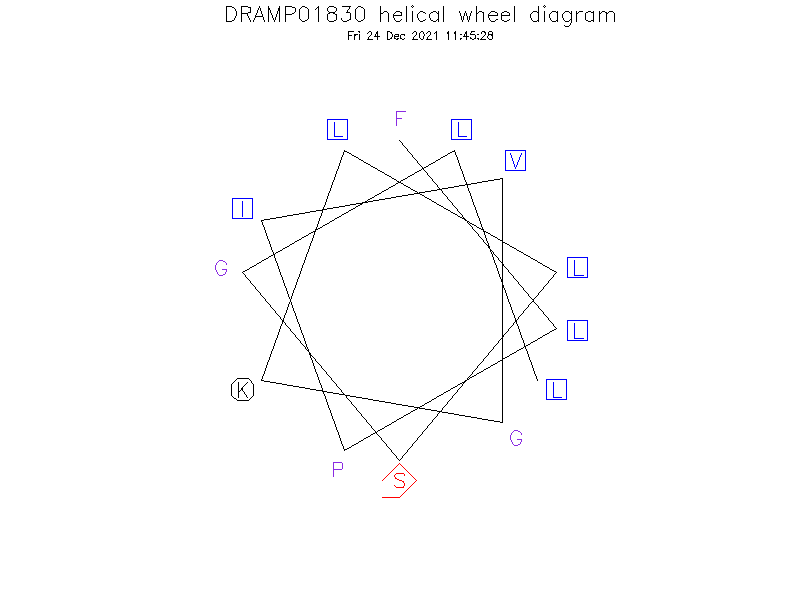General Information
-
DRAMP ID
- DRAMP01830
-
Peptide Name
- Temporin-1P (Temporin-1M; Temporin-1CSa; Frogs, amphibians, animals)
-
Source
- Rana pipiens (Northern leopard frog)
-
Family
- Belongs to the frog skin active peptide family (Brevinin subfamily)
-
Gene
- Not found
-
Sequence
- FLPIVGKLLSGLL
-
Sequence Length
- 13
-
UniProt Entry
- P82848
-
Protein Existence
- Protein level
Activity Information
-
Biological Activity
- Antimicrobial, Antibacterial, Anti-Gram+
-
Target Organism
-
- [Ref.10651828] Gram-positive bacterium: Staphylococcus aureus (MIC=110 µM).
-
Hemolytic Activity
-
- [Ref.17451843] LC50 = 75 μM against human erythrocytes.
-
Cytotoxicity
- No cytotoxicity information found in the reference(s) presented
-
Binding Target
- Not found
Structure Information
-
Linear/Cyclic
- Cyclic
-
N-terminal Modification
- Free
-
C-terminal Modification
- α‐Amidation
-
Nonterminal Modifications and Unusual Amino Acids
- None
-
Stereochemistry
- L
-
Structure
- Not found
-
Structure Description
- Not found
-
Helical Wheel Diagram
-
PDB ID
- None
-
Predicted Structure
- There is no predicted structure for DRAMP01830.
Physicochemical Information
-
Formula
Absent Amino Acids
Common Amino Acids
Mass
- 0
PI
- 0
Basic Residues
Acidic Residues
Hydrophobic Residues
Net Charge
-
Boman Index
- 0
Hydrophobicity
- 0
Aliphatic Index
- 0
Half Life
-
- Mammalian:
- Yeast:
- E.coli:
Extinction Coefficient Cystines
Absorbance 280nm
- 0
Polar Residues
DRAMP01830
Comments Information
Function
- Antibacterial activity against Gram-positive bacteria.
Tissue specificity
- Expressed by the skin glands.
PTM
- Leucine amide at position 13.
Literature Information
- ·Literature 1
-
Title
- Peptides with antimicrobial activity from four different families isolated from the skins of the North American frogs Rana luteiventris, Rana berlandieri and Rana pipiens.
-
Pubmed ID
- 10651828
-
Reference
- Eur J Biochem. 2000 Feb;267(3):894-900.
-
Author
- Goraya J, Wang Y, Li Z, O'Flaherty M, Knoop FC, Platz JE, Conlon JM.
- ·Literature 2
-
Title
- Peptide defenses of the Cascades frog Rana cascadae: implications for the evolutionary history of frogs of the Amerana species group.
-
Pubmed ID
- 17451843
-
Reference
- Peptides 2007; 28: 1268-1274.
-
Author
- Conlon JM, Al-Dhaheri A, Al-Mutawa E, Al-Kharrge R, Ahmed E, Kolodziejek J, Nowotny N, Nielsen PF, Davidson C.

